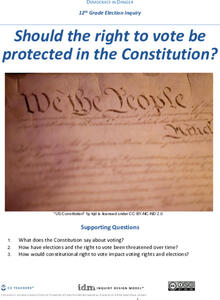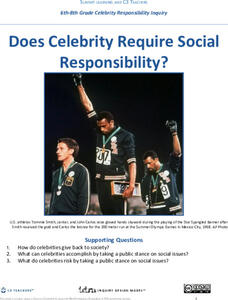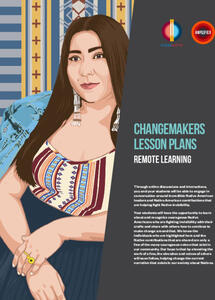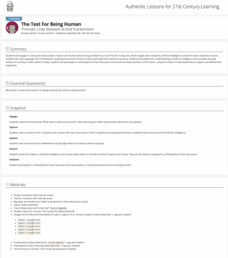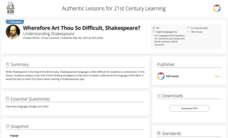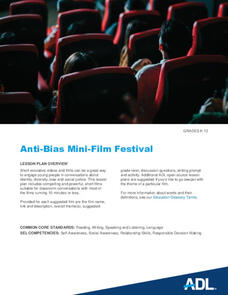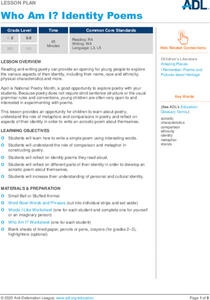University of Minnesota
Memory Items
Ready to have an "unforgettable" time in science class? Try a fun and insightful activity, suitable for a wide age group of learners. Explore how human memory works when pupils try to remember objects they've seen before comparing the...
Core Knowledge Foundation
Early Presidents and Social Reformers
A unit by Core Knowledge begins with information about early United States presidents. Pupils then explore social reformers such as Sojourner Truth and Frederick Douglas, abolitionism, women's rights, and more. Participants listen and...
C3 Teachers
Democracy in Danger: Should the Right to Vote Be Protected in the Constitution?
High school seniors investigate what national, state and local rules say about voting. After examining the Constitution's articles, clauses, and amendments, researchers look at videos, listen to podcasts, and read articles to gather...
C3 Teachers
Black Women Writers: What Gets Black Women Heard?
Zora Neal Hurston, Toni Morrison, and Maya Angelou are featured in a guided inquiry unit. High schoolers research the lives and works of these and other Black women writers and craft an argument, using evidence from their research, to...
C3 Teachers
Uncle Tom’s Cabin: Can Words Lead to War?
"Words, words, words." Despite Hamlet's opinion, words can be significant. In this inquiry lesson, middle schoolers learn how the words in Harriet Beecher Stowe's Uncle Tom's Cabin, in the view of many, lead to the American Civil War. To...
C3 Teachers
2020 Protests: Is There Anything New about the 2020 Protests?
Are marches and protests an effective form of resistance? That is the question high schoolers seek to answer in this inquiry lesson as they compare the 2020 protests to historical ones. Researchers use Venn Diagrams to compare images...
C3 Teachers
Celebrity Social Responsibility: Does Celebrity Require Social Responsibility?
Is much required of those to whom much is given? That's the central question asked of middle schoolers in this lesson. Scholars consider the actions of Tommie Smith and John Carlos, Colin Kaepernick, Lady Gaga, and others who have taken...
K20 LEARN
OPTIC - A Reading Strategy Recipe: Visual Literacy
A visual literary lesson provides learners with OPTIC (Observations, Predictions, Themes, Inferences, Conclusions), a reading strategy to help them understand and interpret visual and written texts. Scholars practice the strategy with a...
K20 LEARN
Move, Flip, and Slide! Building Relationships and Community In the Classroom
Here's a fresh take on those first days of school introductions. Learners use Flipgrid to create a video that introduces themselves to their classmates. The richly detailed and carefully scaffolded lesson plan provides specific...
Curated OER
Changemakers Lesson Plans
Teens and tweens are invited to become changemakers in a five-lesson unit, asking them to investigate and share what they have learned about exemplary, contemporary Native Americans. They gather facts about their research subject, record...
K20 LEARN
Word Warriors: The Code Talkers of Oklahoma
The battle between code makers and code breakers has been going on for centuries and is a key tool of warfare. The contributions of the Native American Code Talkers of World Wars I and II are celebrated in a instructional activity that...
Anti-Defamation League
Impact of the U.S. Expansion on Indigenous People and Stereotypes About Native American People
The 2004 U.S. bicentennial sparks a discussion about its meaning and importance to United States history. Readings, maps, tables, and reflective writing prompt small groups to explore the westward expansion, Lewis and Clark, and how...
K20 LEARN
To Ban or Not to Ban? Intellectual Rights and Responsibilities: Banned Books, Censorship Part 2
After examining different perspectives on book banning, scholars select a book from a list of frequently banned books and research the controversies surrounding it. They then craft an argument about their chosen book, including arguments...
K20 LEARN
The Test for Being Human: Thematic Links Between AI and Frankenstein
"It's alive!" Or is it? Scholars tackle the question of what it means to be human in a lesson that asks them to research the Turning Test and other devices that attempt to prove whether AI devices can pass as humans. After participants...
K20 LEARN
Wherefore Art Thou So Difficult, Shakespeare? Understanding Shakespeare
'Tis not easy to understand the language of the Bard! But, hark! Fret not! With the assistance of this joyous activity, young players learn how to translate Shakespeare's English into modern language. Groups examine passages from Julius...
Anti-Defamation League
The Revealers: Discussion Guide for Grades 6-8
Suspense! Rebellion! Cyberbullying! No wonder Doug Wilhelm's novel The Revealers appeals to middle schoolers. Instructors new to using the novel and experienced veterans will find this discussion guide invaluable. Discussion questions,...
Anti-Defamation League
Anti-Bias Mini-Film Festival
Imagine a resource that provides all the materials you need to organize a film festival. Imagination becomes a reality with a five-star resource that has done all the work for you. Eight different award-winning short films are featured...
Anti-Defamation League
The Skin I’m In: Discussion Guide for Grades 8 and Up
Words can hurt! But self-esteem can blunt the impact. That's the takeaway when discussing the themes in Sharon G. Flake's powerful novel The Skin I'm In. A discussion guide leads groups through a study of this narrative of a girl who is...
Anti-Defamation League
8 Ideas for Teaching National Hispanic Heritage Month
Here are eight ideas to celebrate National Hispanic Month! Scholars have the opportunity to read and discuss literature, include people and events in history, examine art, watch and discuss films, listen to and dance to music, explore...
K20 LEARN
Comparing/Contrasting Characters Through Two-Voice Poems: Characterization
Two babies, two fathers, two experiences, two worlds. Partners craft two-voice poems to capture the points of view of two men with very different lives who have just become fathers.
K20 LEARN
Argument Is Everywhere: Introduction to Argument
C.E.R = Claim + Evidence + Reasoning. That's the framework behind building a solid piece of argument writing. Introduce young writers to this format with an engaging lesson that uses YouTube videos and a PowerPoint to illustrate the...
Anti-Defamation League
Dolls Are Us
Representation matters! A lesson examines the looks of dolls and discusses whether the design is inclusive or not. Scholars create a paper doll representing a characteristic about themselves or highlights another diverse quality....
Anti-Defamation League
Who Am I? Identity Poems
A lesson celebrating identity begins with a something-about-me activity, then moves on to writing favorite words. Class members then brainstorm metaphors and comparisons and read a poem to inspire their poetic abilities. Scholars craft...
K20 LEARN
A Trait Accompli: An Introduction to Mendelian Genetics
Young scientists learn the laws of genetics through data collection and research. They use discussions and online resources to develop an understanding of the related vocabulary.




